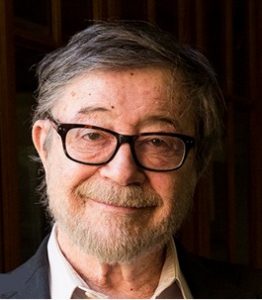Ruth Pearl, wife of professor Judea Pearl, passed away at 85
August 1, 2021
Judea Pearl is the recipient of the fourteenth edition of the ICT Frontiers of Knowledge Award from the Spanish bank group BBVA for “providing a modern foundation to Artificial Intelligence”. The award includes a prize of €400,000 (about $457,000).

Inaugurated in 2008 by the major multinational Spanish banking group, BBVA, Frontiers of Knowledge is an international award program which recognizes significant contributions in the areas of scientific research and cultural creation, with ICT being one of its eight categories. Over the last decade we have reported it being awarded to Marvin Minsky (2013), for “shaping the field of AI”; to Shafi Goldwasser, Silvio Micali, Ronald Rivest and Adi Shamir (2017) for their “fundamental contributions to modern cryptology“; to Ivan Sutherland (2018) for “pioneering the move from text-based to graphical computer displays“; and two years ago to Isabelle Guyon, Bernhard Schölkopf and Vladimir Vapnik for their “fundamental contributions to machine learning”.
Artificial Intelligence is again the focus for the latest award. According to the selection committee, Judea Pearl, who is a Professor of Computer Science and Director of the Cognitive Systems Laboratory at the University of California, Los Angeles (UCLA):
made conceptual mathematical and formal contributions that enable AI programs to effectively interiorize two of the key resources we humans use to interpret the world and arrive at decisions: probability and causality. With the formal language he developed, these vital decision-making processes can be encoded into computer programs.
In the 1980s Pearl devised the mathematical language needed to bring together classical AI and probability theory. His book Probabilistic Reasoning in Intelligent Systems, published in 1988, presented the graphical models, or “Bayesian networks,” that have since become a mainstay of machine learning and modern statistics. One of several nominators of Pearl, Vint Cerf notes that Pearl’s latest books on causality and reasoning:
“are milestones in Bayesian analysis and machine learning. Pearl makes a powerful argument that without a causal model, the correlations discovered by deep neural networks will not bear much fruit.”
Nominator Ramón López de Mántaras, head of the Artificial Intelligence Research Institute (IIIA) of the Spanish National Research Council stated:
“Pearl’s work is fundamental because it provides tools that will equip machines with the kind of cause-and-effect driven knowledge each one of us uses in our daily lives. He has devised a mathematical language whereby an AI system can ask not just ‘Why’ questions about the reasons things happen but also ‘What if’ questions, that is, what would have happened if things had been done differently. In medicine, for instance, we can ask what might have happened if we had prescribed the patient a different medication.”
In this video interview from the BBVA Foundation Pearl explains the contributions made to AI by his research and gives his opinions on the future of AI and the prospect of artificial intelligence surpassing human intelligence:
Ten years ago Pearl was awarded the Turing Prize. More details of his achievements are given in our report, which has a video made by the ACM.
AI World Society - Powered by BGF